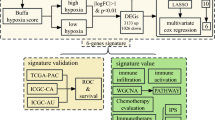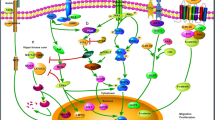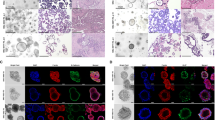Summary
Pancreatic cancer (PC) is one of the most lethal gastrointestinal malignancies. The PTEN/AKT signalling pathway is closely related to the tumourigenesis and progression of PC. The downstream effectors, FOXO3a, PLZF and VEGF, are reported to be involved in angiogenesis, lymph node metastasis and poor survival in PC. By using tissue microarrays and immunohistochemistry, we found, that PTEN, FOXO3a and PLZF expression was significantly decreased in PC specimens compared with that in chronic pancreatitis (CP) specimens, while VEGF expression was significantly increased. Furthermore, the expression of PTEN was positively correlated with that of FOXO3a and PLZF but negatively correlated with that of VEGF. Our results suggest that the PTEN/FOXO3a/PLZF signalling pathway may negatively regulate VEGF expression in PC. Through clinical analysis of 69 PC patients, PTEN, FOXO3a and PLZF expression was found to be significantly decreased in specimens from PC patients with lymph node metastasis and poor prognosis, while VEGF expression was significantly increased. Taken together, these reaults suggest that the PTEN/FOXO3a/PLZF signalling pathway may be capable of inhibiting growth and metastasis in PC by regulating VEGF-mediated angiogenesis, which requires further in vivo and in vitro studies and can potentially be a therapeutic target for PC.




Similar content being viewed by others
References
Vincent A, Herman J, Schulick R, Hruban RH, Goggins M (2011) Pancreatic cancer. Lancet 378(9791):607–620
Benckert C, Thelen A, Cramer T, Weichert W, Gaebelein G, Gessner R, Jonas S (2012) Impact of microvessel density on lymph node metastasis and survival after curative resection of pancreatic cancer. Surg Today 42(2):169–176
Niedergethmann M, Hildenbrand R, Wostbrock B, Hartel M, Sturm JW, Richter A, Post S (2002) High expression of vascular endothelial growth factor predicts early recurrence and poor prognosis after curative resection for ductal adenocarcinoma of the pancreas. Pancreas 25(2):122–129
Vincent A, Omura N, Hong SM, Jaffe A, Eshleman J, Goggins M (2011) Genome-wide analysis of promoter methylation associated with gene expression profile in pancreatic adenocarcinoma. Clin Cancer Res 17(13):4341–4354
Hsu YH, Chen YC, Chen TH, Sue YM, Cheng TH, Chen JR, Chen CH (2012) Far-infrared therapy induces the nuclear translocation of PLZF which inhibits VEGF-induced proliferation in human umbilical vein endothelial cells. PLoS One 7(1):e30674
Ball HJ, Melnick A, Shaknovich R, Kohanski RA, Licht JD (1999) The promyelocytic leukemia zinc finger (PLZF) protein binds DNA in a high molecular weight complex associated with cdc2 kinase. Nucleic Acids Res 27(20):4106–4113
Melnick A, Carlile G, Ahmad KF, Kianq CL, Corcoran C, Bardwell V, Prive GG, Licht JD (2002) Critical residues within the BTB domain of PLZF and Bcl-6 modulate interaction with corepressors. Mol Cell Biol 22(6):1804–1818
Parrado A, Robledo M, MoyaQuiles MR, Marin LA, Chomienne C, Padua RA, Alvarez- López MR (2004) The promyelocytic leukemia zinc finger protein down-regulates apoptosis and expression of the proapoptotic BID protein in lymphocytes. Proc Natl Acad Sci U S A 101(7):1898–1903
Kang SI, Chang WJ, Cho SG, Kim IY (2003) Modification of promyelocytic leukemia zinc finger protein (PLZF) by SUMO-1 conjugation regulates its transcriptional repressor activity. J Biol Chem 278(51):51479–51483
Guidez F, Ivins S, Zhu J, Söderström M, Waxman S, Zelent A (1998) Reduced retinoic acid-sensitivities of nuclear receptor corepressor binding to PML- and PLZF-RARalpha underlie molecular pathogenesis and treatment of acute promyelocytic leukemia. Blood 91(8):2634–2642
McConnell MJ, Chevallier N, Berkofsky-Fessler W, Giltnane JM, Malani RB, Staudt LM, Licht JD (2003) Growth suppression by acute promyelocytic leukemia-assoeiated protein PLZF is mediated by repression of c-myc expression. Mol Cell Biol 23(24):9375–9388
Brunner G, Reitz M, Schwipper V, Tilkorn H, Lippold A, Biess B, Suter L, Atzpodien J (2008) Increased expression of the tumor suppressor PLZF is a continuous predictor of long-term survival in malignant melanoma patients. Cancer Biother Radiopharm 23(4):451–459
Wang X, Wang L, Guo S, Bao Y, Ma Y, Yan F, Xu K, Xu Z, Jin L, Lu D, Xu J, Wang JC (2013) Hypermethylation reduces expression of tumorsuppressor PLZF and regulates proliferation and apoptosis in non-small-cell lung cancers. FASEB J 27(10):4194–4203
Bernardo MV, Yelo E, Campillo JA, Parrado A (2007) Identification of apoptosis-related PLZF target genes. Biochem Biophys Res Commun 359(2):317–322
Rho SB, Park YG, Park K, Lee SH, Lee JH (2006) A novel cervical cancer suppressor 3 (CCS-3) interacts with the BTB domain of PLZF and inhibits the cell growth by inducing apoptosis. FEBS Lett 580(17):4073–4080
Ito G, Uchiyama M, Kondo M, Mori S, Usami N, Maeda O, Kawabe T, Hasegawa Y, Shimokata K, Sekido Y (2004) Kruppel-like factor 6 is frequently down-regulated and induces apoptosis in non-small cell lung cancer cells. Cancer Res 64(11):3838–3843
Felicetti F, Errieo MC, Bottero L, Segnalini P, Stoppacciaro A, Biffoni M, Felli N, Mattia G, Petrini M, Colombo MP, Peschle C, Carè A (2008) The promyeloeyticleukemia zincfinger-microRNA 221/−222 pathway controls melanoma progression through multiple oncogenic mechanisms. Cancer Res 68(8):2745–2754
Suliman BA, Xu D, Williams BR (2012) The promyelocytic leukemia zinc finger protein: two decades of molecular oncology. Front Oncol 2:74
Cao J, Zhu S, Zhou W, Li J, Liu C, Xuan H, Yan J, Zheng L, Zhou L, Yu J, Chen G, Huang Y, Yu Z, Feng L (2013) PLZF mediates the PTEN/AKT/FOXO3a signaling in suppression of prostate tumorigenesis. PLoS One 8(12):e77922
Boreddy SR, Pramanik KC, Srivastava SK (2011) Pancreatic tumor suppression by benzyl isothiocyanate is associated with inhibition of PI3K/AKT/FOXO pathway. Clin Cancer Res 17(7):1784–1795
Yamamoto S, Tomita Y, Hoshida Y, Morooka T, Nagano H, Dono K, Umeshita K, Sakon M, Ishikawa O, Ohigashi H, Nakamori S, Monden M, Aozasa K (2004) Prognostic significance of activated Akt expression in pancreatic ductal adenocarcinoma. Clin Cancer Res 10(8):2846–2850
Tekc ham DS, Gupt a S, Shrivastav BR, Tiwari PK (2017) Epigenetic Downregulation of PTEN in gallbladder Cancer. J Gastrointest Cancer 48(1):110–116
Golm ohamm adi R, Rakhshani MH, Moslem AR, Pejhan A (2016) Prognostic role of PTEN gene expression in breast cancer patients from north-East Iran. Asian Pac J Cancer Prev 17(9):4527–4531
Wise HM, Herm ida MA, Leslie NR (2017) Prostate cancer, PI3K, PTEN and prognosis. Clin Sci (Lond) 131(3):197–210
Skinner HD, Zheng JZ, Fang J, Agani F, Jiang BH (2004) Vascular endothelial growth factor transcriptional activation is mediated by hypoxia-induciblefactor 1α, HDM2, and p70S6K1 in response tophosphatidylinositol 3-kinase/AKT signaling. J Biol Chem 279(44):45643–45651
Fukuda R, Hirota K, Fan F, Jung YD, Ellis LM, Semenza GL (2002) Insulin-like growth factor 1 induces hypoxia-inducible factor 1Ymediated vascular endothelial growth factor expression, which is dependent on MAP kinase and phosphatidylinositol 3-kinase signaling in colon cancer cells. J Biol Chem 277(41):38205–38211
Thomas RM, Jaquish DV, French RP, Lowy AM (2010) The RON tyrosine kinase receptor regulates vascular endothelial growth factor production in pancreatic cancer cells. Pancreas 39(3):301–307
Kobayashi N, Seto K, Orikawa Y, Hamano H, Yoshinaga K, Takei M (2010) Z-360, a novel cholecystokinin-2/gastrin receptor antagonist, inhibits gemcitabine-induced expression of the vascular endothelial growth factor gene in human pancreatic cancer cells. Biol Pharm Bull 33(2):216–222
Hariharan D, Saied A, Kocher HM (2008) Analysis of mortality rates for pancreatic cancer across the world. HPB (Oxford) 10(1):58–62
Siegel R, Naishadham D, Jemal A (2012) Cancer statistics, 2012. CA Cancer J Clin 62(5):10–29
Neoptolemos JP, Stocken DD, Bassi C, Ghaneh P, Cunningham D, Goldstein D, Padbury R, Moore MJ, Gallinger S, Mariette C, Wente MN, Izbicki JR, Friess H, Lerch MM, Dervenis C, Oláh A, Butturini G, Doi R, Lind PA, Smith D, Valle JW, Palmer DH, Buckels JA, Thompson J, McKay CJ, Rawcliffe CL, Büchler MW, European Study Group for Pancreatic Cancer (2010) Adjuvant chemotherapy with fluorouracil plus folinic acid vs gemcitabine following pancreatic cancer resection: a randomized controlled trial. JAMA 304(10):1073–1081
Carracedo A, Pandolfi PP (2008) The PTEN-PI3K pathway: of feedbacks and cross-talks. Oncogene 27(41):5527–5541
Carnero A, Blanco-Aparicio C, Renner O, Link W, Leal JF (2008) The PTEN/PI3K/AKT signalling pathway in cancer, therapeutic implications. Curr Cancer Drug Targets 8(3):187–198
Weng M, Luo Z-L, Wu X-L, Zeng W-Z (2017) The E3 ubiquitin ligase NEDD4 is translationally upregulated and facilitates pancreatic cancer. Oncotarget 8(12):20288–20296
Ma J, Sawai H, Ochi N, Matsuo Y, Xu D, Yasuda A, Takahashi H, Wakasugi T, Takeyama H (2009) PTEN regulates angiogenesis through PI3K/Akt/VEGF signaling pathway in human pancreatic cancer cells. Mol Cell Biochem 331(1–2):161–171
Ying H, Elpek KG, Vinjamoori A, Zimmerman SM, Chu GC, Yan H, Fletcher-Sananikone E, Zhang H, Liu Y, Wang W, Ren X, Zheng H, Kimmelman AC, Paik JH, Lim C, Perry SR, Jiang S, Malinn B, Protopopov A, Colla S, Xiao Y, Hezel AF, Bardeesy N, Turley SJ, Wang YA, Chin L, Thayer SP, DePinho RA (2011) PTEN is a major tumor suppressor in pancreatic ductal adenocarcinoma and regulates an NF-κB-cytokine network. Cancer Discov 1(2):158–169
Li J, Gu D, Lee SS, Song B, Bandyopadhyay S, Chen S, Konieczny SF, Ratliff TL, Liu X, Xie J, Cheng JX (2016) Abrogating cholesterol esterification suppresses growth and metastasis of pancreatic cancer. Oncogene 35(50):6378–6388
Chu M, Wang T, Sun A, Chen Y (2018) Nimesulide inhibits proliferation and induces apoptosis of pancreatic cancer cells by enhancing expression of PTEN. Exp Ther Med 16(1):370–376
Acknowledgments
This work was supported by the Ningbo Natural Science Foundation (grant number 2016A610189).
Author information
Authors and Affiliations
Corresponding author
Ethics declarations
Conflict of interest
Qiubo Zhang declares that she has no conflict of interest. Xuanna Li declares that she has no conflict of interest. Yaqing Li declares that she has no conflict of interest. Shaojie Chen declares that she has no conflict of interest. Xiaoling Shen declares that she has no conflict of interest. Xianwen Dong declares that he has no conflict of interest. Yufei Song declares that she has no conflict of interest. Xuesong Zhang declares that he has no conflict of interest. Kaihong Huang declares that he has no conflict of interest.
Ethical approval
This study was performed under a protocol approved by the Hospital Research Ethics Committee of Sun Yat-Sen University.
Informed consent
Informed consent was obtained from all individual participants included in the study.
Declaration of interest
The authors have no other relevant affiliations or financial involvement with any organization or entity with a financial interest in or financial conflict with the subject matter or materials discussed in the manuscript apart from those disclosed.
Additional information
Publisher’s note
Springer Nature remains neutral with regard to jurisdictional claims in published maps and institutional affiliations.
Rights and permissions
About this article
Cite this article
Zhang, Q., Li, X., Li, Y. et al. Expression of the PTEN/FOXO3a/PLZF signalling pathway in pancreatic cancer and its significance in tumourigenesis and progression. Invest New Drugs 38, 321–328 (2020). https://doi.org/10.1007/s10637-019-00791-7
Received:
Accepted:
Published:
Issue Date:
DOI: https://doi.org/10.1007/s10637-019-00791-7




